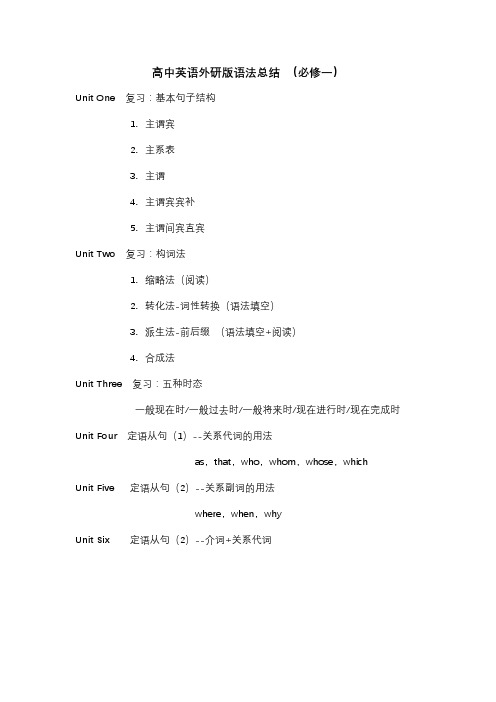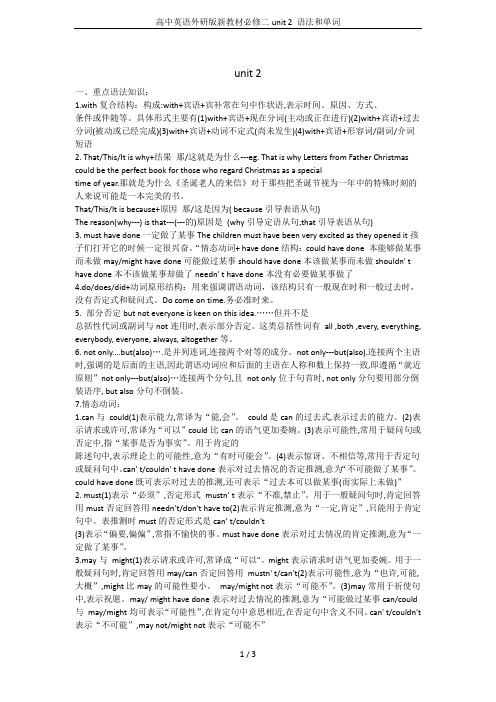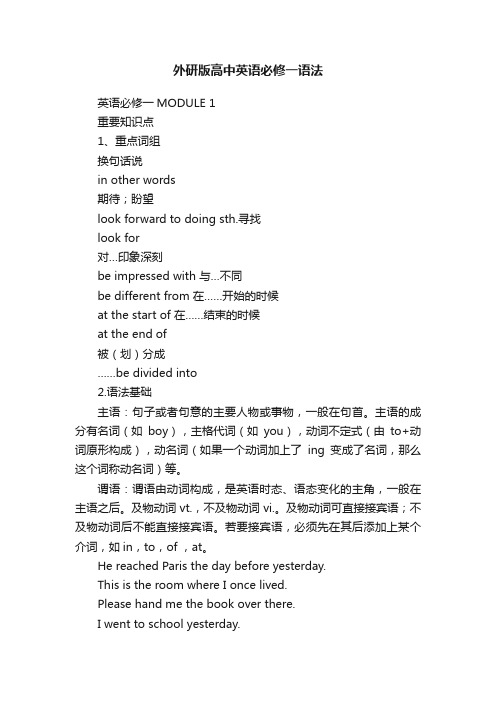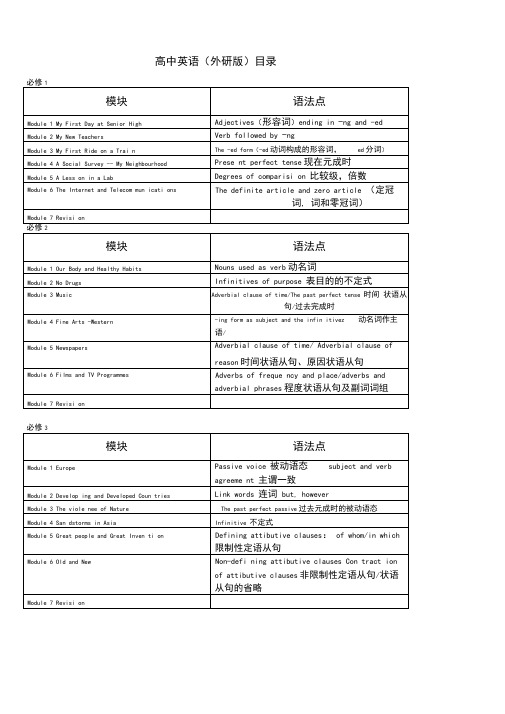外研版高中英语语法
高中英语外研版语法总结-必修

Unit One 复习:基本句子结构1.主谓宾2.主系表3.主谓4.主谓宾宾补5.主谓间宾直宾Unit Two 复习:构词法1.缩略法(阅读)2.转化法-词性转换(语法填空)3.派生法-前后缀(语法填空+阅读)4.合成法Unit Three 复习:五种时态一般现在时/一般过去时/一般将来时/现在进行时/现在完成时Unit Four 定语从句(1)--关系代词的用法as,that,who,whom,whose,whichUnit Five 定语从句(2)--关系副词的用法where,when,whyUnit Six 定语从句(2)--介词+关系代词Unit One 情态动词(1)--情态动词的功能Unit Two 情态动词(2)can/could;may/might;will/would;shall/should等be able to dodare do 胆敢Unit Three 非谓语—不定式作定语和结果状语Unit Four 非谓语—现在分词作状语状语:时间;地点;原因,结果,条件,让步,伴随,方式等Unit Five 非谓语—现在分词作定语Unit Six 非谓语—现在分词,不定式和过去分词作补语Unit One 非谓语—过去分词作状语(被动,完成)Unit Two 非谓语—过去分词作定语(被动,完成)Unit Three 现在完成时的被动语态have/has been doneUnit Four 现在进行时的被动语态be being doneUnit Five 过去将来时1.宾语从句2.叙述过去的事情3.非真实,虚拟语气Unit Six 省略1.and/but 并列句2.状语从句3.定语从句4.名词性从句。
高中英语外研版新教材必修二unit 2 语法和单词

unit 2一、重点语法知识:1.with复合结构:构成:with+宾语+宾补常在句中作状语,表示时间、原因、方式、条件或伴随等。
具体形式主要有(1)with+宾语+现在分词(主动或正在进行)(2)with+宾语+过去分词(被动或已经完成)(3)with+宾语+动词不定式(尚未发生)(4)with+宾语+形容词/副词/介词短语2. That/This/It is why+结果那/这就是为什么---eg. That is why Letters from Father Christmas could be the perfect book for those who regard Christmas as a specialtime of year.那就是为什么《圣诞老人的来信》对于那些把圣诞节视为一年中的特殊时刻的人来说可能是一本完美的书。
That/This/It is because+原因那/这是因为( because引导表语从句)The reason(why---) is that---(---的)原因是(why引导定语从句,that引导表语从句)3. must have done一定做了某事The children must have been very excited as they opened it孩子们打开它的时候一定很兴奋。
“情态动词+ have done结构:could have done 本能够做某事而未做may/might have done可能做过某事should have done本该做某事而未做shouldn' t have done本不该做某事却做了needn' t have done本没有必要做某事做了4.do/does/did+动词原形结构:用来强调谓语动词,该结构只有一般现在时和一般过去时,没有否定式和疑问式。
Do come on time.务必准时来。
外研版高中英语语法总结(超全)

外研版高中英语语法总结(超全)必修一Module 1in other words 换句话说In other words, you have to have both. Product and promotion. 换句话说,你必须两手都要抓,产品和促销不可偏废。
look forward to 期待;盼望I look forward to your guidance. 我期待获得你们的指导。
at the start of 在……开始的时候We are at the start of the season. 我们现在是在赛季开始的阶段。
at the end of 在……结束的时候There is a shop at the end of the street. 这条街走到头有一个商店。
go to college 上大学What about deciding on where to go to college? 对于该去哪里上大学,该如何决定?be divided into 被(划)分成……He suggested that our class should be divided into five groups. 他建议说我们的班应该分成五个小组。
take part in 参加Take part in something you believe in. 参与到你所信仰的事情当中。
Module 2make sure 确定;确信;查明;弄清楚I make sure they work well. 我确认他们做得很好。
so that (引起表示结果的从句)因此He wrote down my address, so that he might remember it. 他写下了我的地址,以便能够记住它。
make progress 取得进步Modesty helps one to make progress; conceit makes one lag behind. 虚心使人进步,骄傲使人落后。
外研版高中英语必修一语法

外研版高中英语必修一语法英语必修一MODULE 1重要知识点1、重点词组换句话说in other words期待;盼望look forward to doing sth.寻找look for对…印象深刻be impressed with 与…不同be different from 在……开始的时候at the start of 在……结束的时候at the end of被(划)分成……be divided into2.语法基础主语:句子或者句意的主要人物或事物,一般在句首。
主语的成分有名词(如boy),主格代词(如you),动词不定式(由to+动词原形构成),动名词(如果一个动词加上了ing变成了名词,那么这个词称动名词)等。
谓语:谓语由动词构成,是英语时态、语态变化的主角,一般在主语之后。
及物动词vt.,不及物动词vi.。
及物动词可直接接宾语;不及物动词后不能直接接宾语。
若要接宾语,必须先在其后添加上某个介词,如in,to,of ,at。
He reached Paris the day before yesterday.This is the room where I once lived.Please hand me the book over there.I went to school yesterday.宾语:宾语分为直接宾语和间接宾语两大类,其中直接宾语指动作的直接对象,间接宾语说明动作的非直接,但受动作影响的对象。
一般而言,及物动词后面最少要有一个宾语,而该宾语通常为直接宾语,有些及物动词要求两个宾语,则这两个宾语通常一个为直接宾语,另一个为间接宾语。
例:The boy needs a pen.I teach him English.定语:对主语或者宾语的修饰。
汉语中常用“……的”表示。
主要有形容词此外还有名词、代词、数词、介词短语、动词不定式(短语)、分词、定语从句或相当于形容词的词、短语或句子都可以作定语。
外研版高中英语必修三module3语法

5. He said, “Mother, the boy is very naughty.”
→He _____ very naughty. A. said his mother that the boy was B. said to his mother that the boy is C. told his mother that the boy was D. spoke to his mother that the boy
“Don’t be late again.”
→The teacher told the student not to be late again.
2. “Wake him up,” she said to me.
→ She told me to wake him up.
21
5. 过去时如有表示具体年份的状语,不 必改变时态。
2. “Have you seen the film?” he asked me.
→He asked me _______. A. had I seen the film B. have I seen the film C. if I have seen the film D. whether I had seen the film
→She asked whether we came from the same city.
19
3. 引语为特殊疑问句时,可以保留疑 问词,后跟陈述句。
1. He asked me, “Where are you going?”
→He asked me where I was going.
2. She asked him, “Whom do you want to see?”
(完整版)高中外研版目录及语法点

高中英语(外研版)目录1234567选修8选8 Module 1 Deep South Module 5 The Con quest of the Uni verseModule 2 The Ren aissa nee Module 6 The Tang PoemsModule 3 Foreig n Food Module 7 Revisi onModule 4 Which En glish?经典英文电影台词之廊桥遗梦The Bridges of Madis on Cou ntyWhen some one is sick or hurt, all the n eighbors come in. They pick corn, or harvest oats, whatever. When it's bee n done, you're going to tow n, you can leave your car uni ocked, let the kids run around, don't worry about them.FRANCESCA: No matter how I keep turning it around in my mind -- it does n't seem like the right thing. 弗朗西斯卡:不管我在心中考虑这件事多少次,我始终认为这样做是不对的。
ROBERT: For who?罗伯特:对谁而言?***************************************************************no matter后接关系副词what/ how/ when/ where引导让步状语从句,表示不管女口 : No matter where you go, good luck would always come along with you.不管你走到哪,好运总和你相伴。
外研社高英语必修1语法总结
一、一般现在时一般现在时表示经常性、习惯性的动作,或表示现在的特征、状态。
当主语是非第三人称单数时,行为动词要发生相应的变化。
一般现在时的用法及特点: 1)、表示经常或者反复发生的动作. 如: 我每天吃午饭. I have lunch every day. 2)、还表示现在存在的一种状态. 如:我姐姐是一位老师.My sister is a teacher. 3)、客观真理,客观存在,科学事实。
例如:The earth moves around the sun.地球绕着太阳转。
4)、一般现在时态经常与often(经常)sometimes(有时)always(总是)usually(通常)等频率词连用,也经常与every day(每天), every week(每周), every month(每月), every term(每学期), every year(每年), once a week (一周一次),twice a year(一年两次)等表示时间的词连用。
5)、第三人称单数问题一般现在时中,当主语是第三人称单数时,即常在动词原形后加-s 或-es。
1、当主语不是第三人称单数时,结构是:肯定句: 主语+行为动词原形+其他We speak Chinese. 否定句: 主语+don’t+行为动词原形+其他We don’t speak Chinese. 一般疑问句:Do+主语+行为动词原形+其他?Do you speak Chinese? 肯定回答:Yes,主语+do Yes, we do. 否定回答:No,主语+don’t No, we don’t. 2、当主语是第三人称单数时,谓语动词不能用原形了,而是要相应的变化,其变化规则是:动词原形变第三人称单数的规则与发音规律同名词单数变复数大致相同,请认真观察。
1)、大多数动词在词尾加―S‖在清辅音后发音为[s],在浊辅音及元音后发音为[z]。
如: ①stop-stops [s] ; make-makes [s] ②read-reads [z] ; play-plays [z] 2)、以辅音字母加―y‖结尾的,要先将―y‖变为―i‖,然后在加―es‖读[iz] 如: fly-flies [z];carry-carries [z] study-studies [z]; worry-worries 3)、以―s, x, ch, sh‖结尾的,在词尾加―es‖,发音为[iz] 如: teach-teaches [iz]; watch-watches [iz] 4)、以―o‖结尾的动词,加―es‖,读[z] 如: go-goes [z] do -does [z] 其结构是:肯定句:主语+动词的第三人称单数+其他He speaks English. 否定句:主语+doesn't+动词原形+其他He doesn't speak English. 一般疑问句:Does +主语+动词原形+其他? Does he speak English? 肯定回答:Yes,主语+does. Yes, he does. 否定回答:No,主语+doesn't. No, he doesn't. 练习题:work watch clean write teach wash play read do fly study go drink cry have sit Swim make run carry leave arrive jump come Speak wear walk buy help pack take talk tell know look love live eat want say 1. He________ TV every evening. (watch) 2. We always ________ to school on foot. (go) 3. Tom, with his classmates, often ______ football after school. (play) 4. Your shoes _______ under the bed. (be) 5. ______ here and ______ by me. (come, stand) 6. His uncle usually _________ to work by bus. (go) 7. I always ______ up at six in the morning.(get) 8. John ________ like his father. (look) .布莱克太太经常在英语上帮助我们。
(完整)外研版高一英语必修一语法.doc
必修一语法一、一般现在时2.一般现在时的基本用法(1)一般现在时常表经常发生的动作或者经常存在的状态,常与always,often,usually,everyday,sometimes等表示时间的状语连用①,有时候时间状语可以不表达出来②。
由when,while,before,after,until,as soon as等引导的时间状语从句亦可用一般现在时表示经常发生的动作或存在的状态③。
连词if引导的条件从句有时亦可用一般现在时表示经常发生的动作或存在的状态④。
①I go to school everyday.②Where do you live ?③When I come across a new word I consult the English dictionary.④If you speak slowly, I understand. If you speak quickly, I don’t understand.(2)一般现在时常用语一下情况I.表示日常行为①The boys wake up at seven o’clock, wash, dress quickly and run into thedining-room for breakfast. They wait until they hear the bell and then go to school.II.表示习惯、能力①He never wears a hat in winter.(习惯)②Do you drive, John? (能力)III.表示客观存在①The earth moves round the sun.②Time and tide wait for no man. 岁月不等人IV.报章、杂志、书籍不强调过去时间、单纯表示客观事实(即所载文字依然存在)时,亦用一般现在时①What does the newspaper say?3.一般现在时表现在(1)表说话时刻,这一时刻往往是很短暂的①。
外研版高中英语语法汇总
高中英语语法总结(一)被动语态动词的语态主要分为两种:主动语态与被动语态主动语态指主语是谓语功作的执行者,则为主动关系。
被动语态指主语是谓语动作的承受者,则为被功关系。
i have done the job.(主动句)the job has been done.(被动句)1.被动语态根据时态的不同,可分为以下几种类型:一般现在时:am/is/are+done;一般过去时:was/were+done现在进行时:am/is/are+being done过去进行时:was/were+being done将来时:will/would+be done,be going to be done, be to be done 现在完成时:have/has +been done过去完成时:had+been done将来完成时:will+have been done2被动语态门主功语态一样具有不同时态,其时态的变化取决于时间状语,其时态的变化形式由其助动词be的事态变化形式来体现the house is being painted now.(现在进行时被动语态)eru0ugh has been said to him about it.(现在完成时被动语态)the furniture was bought last week..(过去时被动语态)you'll be punished one day.(将来时被动语态)3.被动语态的意义(1)不知道或没必要指出行为、动作的执行者(无须加buy短语)colour tv sets are sold in that shop.football is plated all over the world.(2)突出和强调行为或动作的承受着。
history is made by the people.the wounded soldiers have been saved by those people.(3)有时主语较长,可后置。
外研高中英语教材语法顺序 表
tenses 复习 的转化 and past 将来进行 复习一般 have done
现在时态 2 will/be forms被动 时
现在时、 词组didn’t
2 adjectives going to 语态
现在进行 need to do
ending in - for future 2 subject
时,现在 和 needn’t
ing and -ed actions and verb
完成时 have done
以-ing和- 一般将来 agreement
的区别
ed结尾的 时
主谓一致
形容词
Module 2
1verbs followed by -ing 后接-ing的 动词
1 the 1 link
infinitive words 状
Module 1 present 1 -ing 1 infinitive 1 revision 1 review 1 present
4
perfect
form and 不定式 of the of the perfect
tense 1 现 the
2 but + passive passive progressive
句
reason whom,in
原因状语 which 限
从句
制性定语
从句中of
whom, in
which
Module 1
1 adverbs 1 non- 1 may 1 review 1
6
compound of
defining have/
of
subjunctive
words 合成 frequency attributive might
- 1、下载文档前请自行甄别文档内容的完整性,平台不提供额外的编辑、内容补充、找答案等附加服务。
- 2、"仅部分预览"的文档,不可在线预览部分如存在完整性等问题,可反馈申请退款(可完整预览的文档不适用该条件!)。
- 3、如文档侵犯您的权益,请联系客服反馈,我们会尽快为您处理(人工客服工作时间:9:00-18:30)。
第1讲 简单句的五种基本结构英语句子的基本结构可以归纳成五种基本句型及其扩大、组合、省略或倒装。
掌握这五种基本句型,是掌握各种英语句子结构的基础。
英语五种基本句型结构如下:主语 谓语用符号表示为: ① S V (主+谓) ② S V O (主+谓+宾)③ S V o O (主+谓+间宾+直宾) ④ S V O C (主+谓+宾+宾补) ⑤ S V P (主+系+表)主语(subject ) 谓语(predicate ) 宾语(object ) 定语(attribute ) 状语(adverbial)补语(complement )表语(predicative )考点1. 基本句型 一:S V (主+谓)这类句子的谓语动词都是不及物动词,都不带宾语,但可以带状语,常见的不及物动词有: act, come, go, work, last, fall, cry, disappear, appear, smile, rise, ring, live, look, listen, laugh, hurry, talk, sleep, graduate, die, care, agree, jump, fail, wait, succeed, stay, sit, lie, shine, happen, take place, rain, snow, ect. 如: It is raining now. (S V) We've worked for 5 hours. (S V) The meeting lasted half an hour. (S V) Time flies. (S V)练习1. 分析下列句子成分,并在后面括号内标明属于五种基本句型中的哪一种vi.vt . link.v. 宾语 宾语(间)宾语(直) 宾语 宾语补足语 表语①⑤② ④ ③1.Dark clouds hung overhead. ( )2.Gradually a smile appeared on her face. ( )3.He is smiling all over his face. ( )4.I did well in English. ( )5.He talked loudly in the classroom yesterday. ( )考点2.基本句型二:SVP(主+系+表)系动词主要是be. 但还有一些动词有些时候也可作系动词,有人称之为半系动词。
I.如何辨别系动词有些动词既可作连系动词,又可以作实义动词。
如何来辨别呢?有一个最简便的方法,即用连系动词be替换句子中的这些动词,句子仍然成立就是连系动词;反之,不能替换的,就是行为动词。
如:①She looks beautiful. (looks变为is之后,她是美丽的,句意没有大的变化,looks是系动词)。
Look at the picture.(look不能换为be, look为实义动词。
)②He felt the book with his right hand.(feel是“摸”的意思,不能换为was, 是实义动词)。
The silk feels soft.(这种丝绸摸起来很柔软,feels换为is之后,句意变化不大,因此是系动词。
)练习2.辨别下列粗体动词是系动词还是实义动词1.The door stays open at night.2.He tasted the food, and the food tasted delicious.3.The book still lies open on the desk.4.What he said proved true..5.He can’t proved his theory(理论).II.常见的系动词①状态系动词用来表示主语状态,只有be一词,例如:He is a teacher. 他是一名教师。
②持续系动词用来表示主语继续或保持一种状况或态度,主要有keep, remain, stay, lie, stand, 例如:He kept silent at the meeting. 他开会时保持沉默。
This matter remains a mystery. 此事仍是一个谜。
The food stays fresh in the fridge.食物在冰箱里仍然很新鲜。
The house stood empty for years.房子空了数年。
He lies awake in bed.他躺在床上,醒着。
③表“像”系动词用来表示"看起来像"这一概念,主要有seem, appear, look, 例如:Something seems wrong. 好像出差了。
He appears young. 他看起来很年轻。
④感官系动词感官系动词主要有look看起来,feel摸起来, smell闻起来, sound听起来, taste尝起来:This kind of cloth feels very soft.这种布手感很软。
This flower smells very sweet.这朵花闻起来很香。
⑤变化系动词这些系动词表示主语变成什么样,变化系动词主要有become, grow, turn, fall, get, go, come, run.He became mad after that. 自那之后,他疯了。
She grew rich within a short time.她没多长时间就富了。
He fell ill yesterday.他昨天病了。
Eggs go bad easily in spring.鸡蛋夏天容易变坏。
His face went red.他的脸变红了。
What he had dreamt of came true.他的梦想实现了。
Still waters run deep.静水流深。
⑥终止系动词表示主语已终止动作,主要有prove, turn out, 表达"证实","变成"之意,例如:The rumor proved false. 这谣言证实有假。
His plan turned out a success.他的计划终于成功了。
(turn out表终止性结果)What he predicted turned out (to be) wrong.他预言的结果是错的。
练习3.用下划线划出下列句中的系动词。
1.His advice proved right.2.The shop stays open till 8 o’clock.3.The machine went wrong.4.All these efforts seem in vain.5.These words sound reasonable.6.The room soon became crowded.7.The days are getting longer and longer.8.He fell ill yesterday.9.Trees turn green in spring.10.What you said sounds great.III.系动词不能单独作谓语,要和表语一起作谓语He is a student. (SVP)Your idea sounds great. (SVP)IV.在一个英语单句中,一般情况要有谓语动词。
要注意:介词短语和形容词不能单独做谓语,要和系动词一起做谓语。
改错:①Our school very beautiful and we like it very much.②Your book on the desk.写作专练1.不要忘了使用系动词1.那食物很可口,我吃了很多。
(the food, delicious)2.那个电影好极了。
(the movie, fantastic)3.不过呢,一些人反对这个计划。
(however, against, the plan)4.他们的意见如下。
(their opinion, as follows)5.就我而言,我赞成这个主意。
(as far as I’m concerned, in favor of)1.他让我们看了一张世界地图。
(show)2.请把熊猫的照片寄给我一张。
(send, a photo of the panda)考点3.基本句型三:SVO(主+谓+宾)此结构是由“主语+及物动词(词组)+宾语”构成。
宾语可以是名词、代词、数词,动名词、动词不定式或词组、the +形容词、分词以及从句等。
如,She likes English.We planted a lot of trees on the farm yesterday.练习4.用下划线划出下列句中的宾语。
1.People all over the world speak English.2.Jim cannot dress himself.3.All of us believe that Jack is an honest boy.4.He did not know what to say.5.He just wanted to stay at home.6.He practices speaking English every day.考点4.基本句型四:SVoO(主+谓+间宾+直宾)有些及物动词可以有两个宾语,如:give给,pass递,bring带,show显示。
这两个宾语通常一个指人,为间接宾语;一个指物,为直接宾语。
间接宾语一般位于直接宾语之前。
一般的顺序为:动词+ 间接宾语+ 直接宾语。
如:He gave me a cup of tea. (SVoO)强调间接宾语顺序为:动词+ 直接宾语+介词+ 间接宾语。
如:Show this house to Mr. Smith.若直接宾语为人称代词:动词+ 代词直接宾语+介词+ 间接宾语。
如:Bring it to me, please. (不能说Bring me it, please。
)常跟双宾语的及物动词有:(需借助to的)allow, bring, deny, give, grant, hand, leave, lend, offer, owe, pass, pay, permit, promise, read, refuse, sell, send, show, teach, tell,wish, write等(需借助for 的)buy, choose, fetch, get, make, order, paint, play(演奏),save, sing, spare等『一般用to多些,用for的记住常用的三个就行:get, buy, make』He sent me an English-Chinese Dictionary.= He sent an English-Chinese Dictionary to me.She bought John a book.= She bought a book for John.练习5.分析下列句子成分,口头说出间接宾语和直接宾语。
